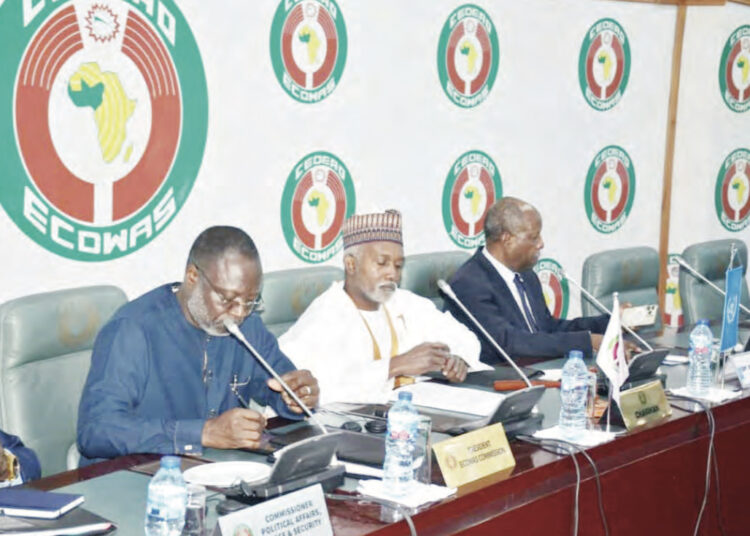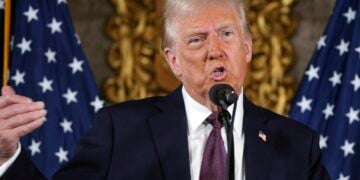The Economic Community of West African States (ECOWAS) and other major stakeholders are making immense efforts to find lasting solutions to the situation in Burkina Faso, Mali and Niger and possibly convince the three countries to return to the regional bloc from where they withdrew last month.
The military rulers in the three Sahel countries announced their withdrawal from the regional bloc following protracted disagreements with ECOWAS as a result of the coups that toppled democratic governments of the three countries and the sanctions that ECOWAS imposed on them.
Considering the implications of allowing the three countries to quit the community, ECOWAS convened an Extraordinary Session of the Mediation and Security Council at the Ministerial Level, held at the ECOWAS Commission in Abuja on Thursday, to resolve the issues and also address the disturbing situation in Senegal over the postponement of the presidential election. This is definitely another major headache for the regional leaders.
Declaring the session open on Thursday in Abuja, Nigeria’s Minister of Foreign Affairs, Ambassador Yusuf Tuggar, who is also the Chair of the Council, in his remarks revealed plans to reconcile the three countries.
He said “Our meeting here today provides us the opportunity to carefully assess the challenges presented by the decision of the military rulers of Burkina Faso, Mali and Niger to arbitrarily to withdraw from ECOWAS, with all the potential implications for the lives of their people, and indeed for the Community as a whole.
“We are also here to review the unfolding situation in Senegal and develop a plan to navigate the resulting complexities.”
In his remarks, the president of the ECOWAS Commission, Omar Touray decried the withdrawal of the three Sahel countries from the community, adding that their reasons for quitting the regional bloc were not plausible.
He also warned of the implications of such withdrawal to the citizens of these three countries, saying “We have therefore prepared two Memoranda on this issue for your consideration, including an analysis of the wider implications of the withdrawal for the concerned Member States and the Community at large.”
The Chairperson of the African Union Commission, Moussa Faki Mahamat, who was represented by Bankole Adeoye, expressed solidarity with the ECOWAS, stressing that the decision by the three countries will undermine regional efforts at making progress.
The West African leaders had in the last couple of months, imposed sanctions on the three breakaway countries and even threatened the use of force to restore the dethroned democratic government in Niger if the military rulers led by Abdourahmane Tchiani fail to return power to the ousted President Mohamed Bazoum after a one week ultimatum.
The ultimatum passed in 2023 and the ECOWAS leaders could not carry out their threat because of enormous pressure from the community citizens and rights groups. However, ECOWAS slammed a raft of crippling sanctions which reportedly alienated the junta in Niger and they quickly found solidarity in fellow coup leaders in Burkina Faso, Mali and Guinea, which threatened that they will unite to fight ECOWAS if it intervened militarily against Niger or the other countries rules by juntas.
Experts are of the view that the initial threat of the use of force against Niger by the ECOWAS Authority of Heads of State and Government chaired by the Nigerian President Bola Tinubu, was a bit hasty, because it lacked power of enforcement.
Senior lecturer in the Department of Political Science, Nasarawa State University, Professor Jideofor Adibe, in a recent TV chart said the ECOWAS easily “exhausted their deterrence element” with the threat of war it was not prepared to fight and now they are in a quandary as the military rulers in Niger now see the threat as empty.
He argued that diplomacy should have been applied to reconcile the disgruntled countries.
It may have been a belated effort to salvage the situation but during his closing remarks at the extraordinary Session, the Nigerian Minister underscored the importance of collective action and dialogue in addressing the complex challenges that confronts the region.
The decision by Burkina Faso, Mali and Niger to withdraw from ECOWAS has presented the region with a serious challenge of diverse implications but consistency could help in the pursuit of resolution that upholds the values of the community.
The three countries collectively have about 50% of the landmass of the entire sub region and about 5% of its economy. This indicates that while the three countries may not matter much in terms of economy, trade and investment, the large area is a threat in terms of issues of insecurity and aviation if they decide to close their airspace to other member countries.
Therefore what is needed to woo back the three breakaway members’ remains dialogue that must be done in the spirit of understanding. The unity and stability of the region depends on the ability to navigate these challenges with wisdom, diplomacy and steadfast commitment to the principles that bind the community and not force. Although the integration efforts have not been so far derailed by the planned exit of these three countries it poses existential threat to its unity of purpose.
This intention of Burkina Faso, Mali and Niger to exit ECOWAS will also bring more hardship and will do more harm to the common citizens of those three countries than good and that is why they must also reconsider their action and return to the fold.
While the community was grappling with the crisis in Burkina Faso, Mali and Niger, another potentially disturbing scenario erupted in Senegal over the decision of the President Macky Sall to indefinitely postpone the presidential election in the country.
On the eve of the commencement of electoral campaigns for the Presidential election in Senegal, President Macky Sall informed the people in an address to the nation of his decision to repeal decree 2023- 2283 of 29 November, 2023, convening the electoral body for the presidential election scheduled for February 25, 2024.
This development has triggered waves of protests and apprehension that Senegal, arguably the most stable democratic country in the region, is about to truncate its enviable democratic history.
Amid lingering protests triggered by the postponement, members of the Senegalese Parliament on Monday voted to fix the election on December 15 but the opposition has rejected that.
The election was initially scheduled for February 25 and its postponement has elicited anger among the opposition as the police and protesters clashed at several locations in the capital Dakar on Monday. During the chaotic debate the police reportedly stormed the parliament and forcibly removed some members of the opposition
However, the regional bloc has warned against violence and urged the security agencies to exercise restraints.
The Commission of ECOWAS in a statement said “It advises against any action or statement that may contravene the provisions of the country’s constitution and reminds the population and the political class of their responsibility to maintain peace and stability in the country.
“The ECOWAS Commission encourages the political class to take steps urgently to restore the electoral calendar in accordance with the provisions of Senegal’s constitution.
“In these trying times for the country and the region, the commission calls on all stakeholders to shun violence and all other actions that may further disturb the peace and stability of the country. It urges the law enforcement agencies to exercise utmost restraints and protect the fundamental rights of all citizens.”
These are very difficult times for ECOWAS, which requires diplomatic tack to address. The uncertainty in Senegal is threatening to sink its democracy. What action ECOWAS will take lies with the complexities of this impasse.
We’ve got the edge. Get real-time reports, breaking scoops, and exclusive angles delivered straight to your phone. Don’t settle for stale news. Join LEADERSHIP NEWS on WhatsApp for 24/7 updates →
Join Our WhatsApp Channel










